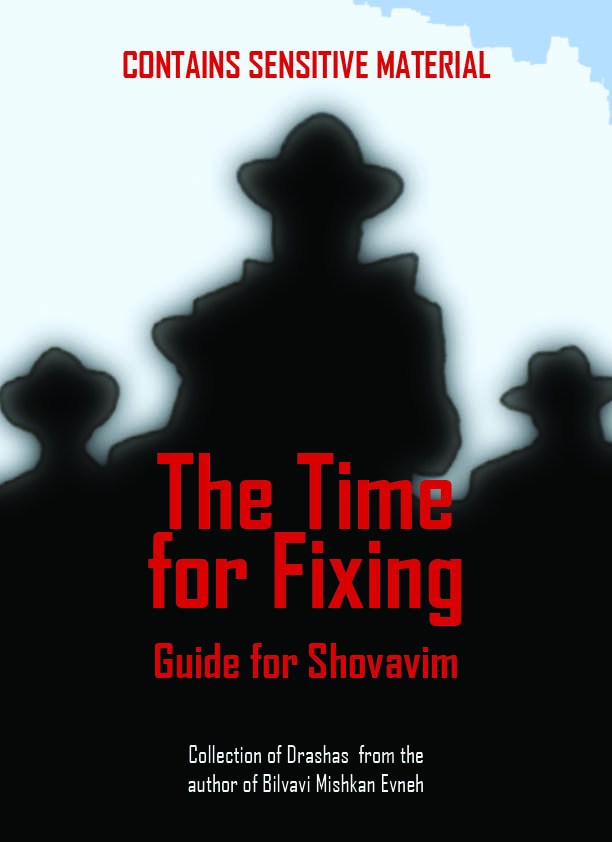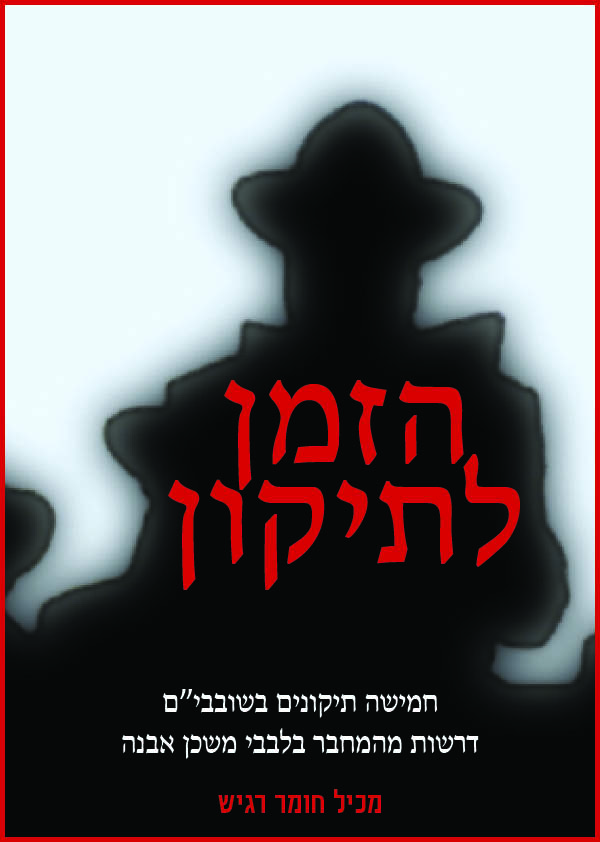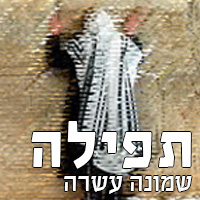- להאזנה תפילה 061 סלח לנו
061 Remaining Pure
- להאזנה תפילה 061 סלח לנו
Tefillah - 061 Remaining Pure
- 7171 reads
- Printer-friendly version
- שלח דף במייל
Why We Ask To Be Forgiven For Sin
סלח לנו אבינו – “Forgive us, our Father.” We are asking Hashem for forgiveness in this blessing of Shemoneh Esrei.
As we know, the words of Shemoneh Esrei were composed by our Sages, the Men of Great Assembly, who were prophets. If so, we are saying words that they composed, which apply to all the generations, for these words were composed with prophecy to all the future generations. When we say these words, when we ask Hashem for forgiveness from our sins, we need to know why we need to say it – why the Sages enacted that we say all these words – and in addition, we need to know the personal motivations inside us as we say these words.
Why do we ask Hashem to be forgiven? What are our intentions as we say these words? Simply, it is because after committing a sin, we must recognize that there is retribution for each sin, unless we are forgiven. We have to be aware that there is Authority who rules over us.
Sin Harms Our Relationship With Hashem
But the deeper understanding is: because sin distances us from the Creator.
It is written, “Their sins separated them.” Our sins damage our relationship with Hashem, and that is why we need to be forgiven, so that the effects of the sin should be removed. Thus, our prayer for forgiveness should be emanating from our soul’s yearning to improve our relationship with Hashem.
When a son rebels against his father, if he is a good son, it hurts him that he has pained his father. In the same way, it should hurt us that we have sinned and rebelled against our Father.
Sin Hurts Our Very Soul
There is yet an even deeper understanding of why we ask Hashem to be forgiven from sins.
We say in the blessing of Elokai Neshamah in the morning, “The soul You placed in me is pure.” Our soul comes from a pure place, and it yearns not only for our Creator, but it also yearns to dwell in purity, because that is its nature. Our soul has been carved out of the Throne of Glory. When it becomes dirtied from sin, it really recoils in disgust from this, because since it comes from a pure place, from Heaven, it is disgusted when it comes into contact with the spiritual muck created from a sin.
If a person sins, chas v’shalom, he should feel pained at this, no less than if his hand has been cut off. It should feel painful to the person, for the act of sin has removed him from his real place.
On a deeper level, if someone feels the light of his soul - the holiness of a Jew, the fact that his soul is pure and from Above, a piece of Hashem – the very fact that he is on this world will be painful to him! Our soul feels like it has been exiled to this world. The fact that our soul is here on this materialistic world is an exile to our soul, for our soul has been placed into our physical body, and this enough is already very painful to our soul.
If someone doesn’t feel his soul, this doesn’t bother him. He doesn’t notice how the situation of this world is really a contradiction to the soul’s nature.
But the more a person feels that he is a soul, the more it bothers him that there is this contradiction taking place: he has been placed in a body, with its desires for this materialistic world, which contradict the spiritual yearnings of the soul. When a person commits a sin, chas v’shalom, a spirit of impurity surrounds him[1], and the more a person sins, the more and more the soul feels pain that it has been contradicted, again and again and again.
If someone doesn’t feel his soul at all, then he isn’t bothered after he commits a sin. But a person who does feel his soul feels an inner disturbance after he commits a sin. For this reason, the greatest tzaddikim, who are much more in touch with their souls, can feel a much more acute suffering after a sin that is committed even unintentionally, because they are very aware of what is taking place in their souls.
Thus, when we ask Hashem for forgiveness, one of the reasons for this is because we have an inner yearning for purity. A hint to this is that the Hebrew word for “forgive”, “selach”, has the same numerical value in Hebrew as the word “tzach”, which means “pure”.
Examples Of Things That Contradict The Purity of Our Soul
Our soul can feel all kinds of contradictions on this world.
One example is when a person indulges in permitted pleasure; this is called a “disgusting one who indulges within the permission of the Torah.” When a person indulges in desires, even desires that are permissible and not forbidden by the Torah, his soul can feel disgust inside at this.[2] This is a simple example of materialism that makes our soul inside recoil.
But in our generation, there is a new kind of problem, in which our surroundings engage in certain actions that might be deemed as a ‘mitzvah’, but the person can sense that if he does such an act, it furthers him from holiness. There are things which other people do that appear to be fine, but just because others are doing it, that doesn’t mean it is fine for everyone else to do.
When a person only has intellectual prowess and he doesn’t develop his soul’s sensitivity, he won’t be sensitive to things which harm his soul. Besides for how we must learn Torah in-depth, we also need to develop our soul’s sensitivity to feel what is holy and what isn’t, what is true and pure, and what isn’t.
Our soul can become sensitive to what truth is; even if we are not prophets, we are called “sons of prophets”, which implies that our soul can still have an inner sense for what the truth is - and what isn’t.
Staying Away From Machlokes\Arguments
We are living in a very confused generation.
Chazal say that “each day is more cursed than the day before it”; if this was true about previous generations, how much more so does it apply to our current generation.
Chazal say that when in doubt, one needs to make for himself a Rav. It was always hard to choose a Rav, but nowadays people have a much harder time finding a Rav, because people don’t know who to ask in the first place about who should be their Rav! How do you choose a Rav in the first place to tell you who should be your Rav, when there is no Rav to ask about this in the first place….?
If someone searches for purity in his life, he will recoil from any machlokes\arguments that are not for the sake of Heaven, rachmana litzlon (May Hashem have mercy on us).
In every argument that takes place, there are elements of lishmah (pure motives) and shelo lishmah (ulterior motives). (If someone never argues with any pure motives at all, his soul is from the Erev Rav[3]). Most people, when they engage in arguments, are doing so with both kinds of motivations together: there are elements in it that are for the sake of Heaven, and there are also elements involved that are notfor the sake of Heaven. But a person who searches for truth should avoid any argument altogether, for all arguments contain some ulterior motivations.
There is no such thing as a machlokes that is totally “l’sheim shomayim” (for the sake of Heaven); since this is case, there is no justification for entering into a machlokes, because nobody can say that they get into a machlokes that is purely “l’sheim shomayim”.
The Danger of Entering Machlokes Today
Every machlokes is a mixture of both good motivations and evil motivations contained in it, since every machlokes has in it elements of both lishmah and shelo lishmah. But when someone enters a machlokes, there is no telling of what will be his end! Anyone who enters into a machlokes and becomes involved with it, no matter which generation he is from, is entering a mixture of good and evil, and he is danger of being swept up by the evil motivations involved in it.
Even in previous generations, if a person ever entered a machlokes with motivations that were l’sheim shomayim, he still lost out from this, losing both this world and the Next World. A person who entered fiercely into a machlokes would be swayed by the evil motivations involved in it and lose all of his spiritual levels in the process.
And this is yet referring to a kind of machlokes that also had in it some elements of lishmah! How much more so does it apply to a modern-day machlokes, where there is mostly shelo lishmah within the machlokes.
Avoiding ‘Shelo Lishmah’ In Our Mitzvos
Chazal say that everything on this world is a mixture of good and evil, and it is mostly evil. Therefore, in anything you encounter, see how everything on this world is a mixture of good and evil, and try to separate yourself from the evil. If you notice something that it is definitely a sin or if it seems like a sin, stay away from it; that goes without saying.
Even when you do a mitzvah, we should notice how some of our motivations are shelo lishmah and try to do it a little more lishmah. This doesn’t mean that you shouldn’t do the mitzvah, chas v’shalom. Do the mitzvah regardless, but just try to become aware of how there is shelo lishmah involved in it, and try to increase the element of lishmah in it.[4]
Avoiding The “Mixture of Good and Evil”: Staying Away From Machlokes
To give an example of how far this concept goes, Chazal say that Hashem was angry with Avraham Avinu for taking Lot with him, because Lot’s shepherds caused machlokes with his shepherds, and therefore he was an indirect cause for the machlokes.
Chazal explain that Avraham Avinu took Lot with him because he saw that Moshiach would come from him. Here we see an example of a mixture of good and evil in one act. It was good that he took Lot with him, because Lot is the ancestor of Moshiach, but at the same time, Avraham Avinu is also criticized for taking Lot with him, because Lot’s shepherds caused machlokes.
Chazal criticize Avraham Avinu for this! How much more so should we avoid arguments that contain ulterior motives, such as to tell lashon hora (gossip) “for the sake of Heaven” - even when it follows all the rules of “toeles” in sefer Chofetz Chaim).
When a person enters a machlokes for the sake of Heaven and he gets involved with all the lashon hora and machlokes there, even when he’s technically not transgressing the halacha, how can he know if he is doing this all for the sake of Heaven?! People usually do not stop to consider if they are saying lashon hora or getting involved in a machlokes for the sake of Heaven. And if anyone does stop to think about it and he thinks that he’s doing it entirely for the sake of Heaven, he is totally delusional.
Shamai and Hilel always argued, but Chazal say that they only argued for the sake of Heaven. However, their students misinterpreted their teachers’ arguments, and because of this, many arguments entered into the Jewish people. Here we see that even a machlokes that was purely for the sake of Heaven eventually evolved into a machlokes that wasn’t for the sake of Heaven [in the later generations]. How much more so it is a problem when it’s a machlokes that resembles the machlokes of Korach and his colleagues, whose intentions were not for the sake of Heaven….
The Sages[5] say that in the era preceding Moshiach, “the wisdom of scholars will rot.” Why? The Sages explain elsewhere that even though jealousy of scholars is a good quality, still, “jealousy makes the bones rot”. This is because if the jealousy isn’t coming from a pure place in the soul, it is infected with impure motivations, and it instead becomes detrimental to one’s Torah wisdom.
Immerse Yourself in Torah, and Don’t Be Involved With The World!
A person who avoids arguments, even arguments that are for the sake of Heaven, lives an elevated kind of life. This is someone who searches for truth.
When someone really searches for truth, he wants peace as well, and this involves a yearning to dwell in a world of purity and pleasantness. He wants the revelation of Hashem to fill the entire Creation, and thus he yearns for pleasantness, and he recoils from what goes on outside the world of Torah.
When someone doesn’t work on this point, he enters into arguments and gets caught up in the external aspects of the arguments.
A person needs to able to run away from the superficiality of the outside world, and enter into the inner world of Torah and keep himself immersed there. Therefore, if you seek truth, don’t get involved with what goes on in the world. Live instead in an inner world that is apart and sheltered from all of this; all of the strife that takes place in the world outside of our Torah learning should feel painful for you to hear about.
Whenever you have to leave the world of Torah and go out into the world for anything, it should feel painful to you. In fact, these days, going out into the world that is outside of our Torah is as dangerous to the soul as death.
Immerse yourself in Torah, in your mind and heart, and make sure you are deeply connected to it. Identify yourself as mainly living in your Torah learning – and make sure you have Ahavas Yisrael too – but don’t involve yourself with what goes on outside the world of Torah. Otherwise, your soul is in mortal danger from what goes on in this world.[6]
In Conclusion
This is the meaning behind our prayer of סלח לנו- we ask Hashem for forgiveness from sin, because it is our soul’s wish deep down to be able to live in a pure world, a world of pure spiritual light in where there is no darkness.
May we all merit to desire this inner world, to realize how lowly the outside world is - and that going out into the world is like walking into a dangerous place. Wherever we go today in the world, outside the inner world of Torah, it is a dangerous place to walk in – simply put. May we all merit to live in an inner world, and may Hashem remove the impurity from the world and its place return His light to it, whereupon a “new light shall shine forth on Zion.”
[1] As stated in Nefesh HaChaim
[2] See Tefillah #057 – Returning To Our Source
[3] Editor’s Note: The Vilna Gaon in his commentary to Tikkunei HaZohar says that one of the signs of Erev are instigators of strife who enjoy strife and do not yield from it.
[4] See Bilvavi Part 2: Chapter 27, Bilvavi Part 4: Chapter 12: Beginning To Act Lishmah and Bilvavi Part 6: Chapters 6-7.
[5] Sotah 49a
[6] See also Fixing Your Water_020_The Desire For Competition, and Tefillah #0170 - Peace
NOTE: Final english versions are only found in the Rav's printed seforim »















